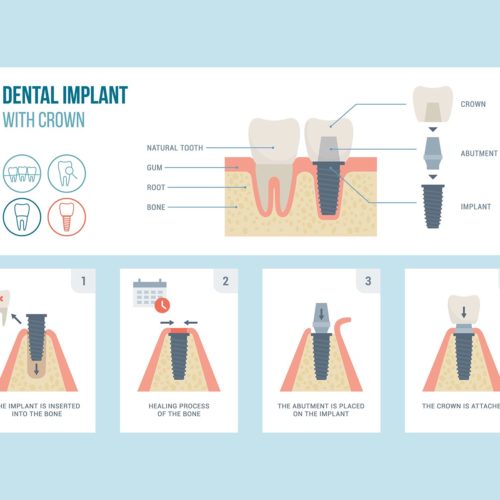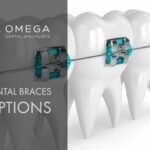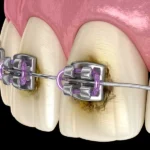Recent Posts
Dental Crowns and Their Benefits

Dental crowns have been around for some time now, and as such, they offer many advantages to dental patients requiring this type of treatment. In short, a crown is considered to be a customized tooth-shaped cover that is positioned permanently over a damaged tooth to restore an excellent cosmetic look and feel. Dental crowns can also be used to provide the final restoration for a dental implant. Perhaps most impressive of all is the fact that crowns can be custom designed to the exact size, shape, look, and color of missing teeth. Understanding dental crowns and their benefits can help patients to make a more informed decision when working as a team with their dental care provider. Here are some clear and obvious benefits worth considering when it comes to new dental crowns.
Table of Contents
Composite Resins and Porcelain Type Materials
For example, crowns are remarkably natural-looking. Because today’s cutting-edge dental crown technology takes advantage of the latest materials such as porcelain and composite resin, they ultimately end up looking incredibly natural and exactly like real teeth. Perhaps what is most impressive is that these modern composite resins and porcelain materials result in translucency and luster that would be expected with real teeth. Patients who have lost teeth to an accident, injury, or disease can take full advantage of all that dental crowns have to offer, resulting in a perfect restoration and a healthy and bright smile. Crowns have been used for many years as a highly effective solution to deal with misshaped, cracked, broken, or severely discolored teeth. They are very versatile and can also be attached to a dental bridge or an implant. Regaining one’s original smile is more achievable today than ever before.
Restorative Work Lasting Many Decades
Another key consideration about dental crowns is that they are remarkably stain-resistant. In other words, because they are made of porcelain, excellent stain resistance should indeed be expected. This is perhaps why so many dental care providers choose porcelain as a preferred material for dental prosthesis. Crowns are also impressive in terms of durability. While dental crowns can last anywhere from 7 to 15 years, there are many reported cases of this type of restorative work lasting many decades and even an entire lifetime. The main determining factor in this regard is how well the patient takes care of their crowns over the years. Routine dental visits and good home-based oral hygiene and dental care can make a big difference in this regard. Equally important when caring for dental crowns is to ensure that clenching, grinding, or excessive pressure is not applied to the restoration.
Designed To Stay Permanently In Place
In simple terms, a crown should be cared for in the same way that natural teeth are cared for throughout a lifetime. Patients should avoid chewing on un-popped corn kernels and ice as well as hard candy. Anything that can damage a natural tooth can be equally as damaging to a dental crown restoration. Another notable benefit of new dental crowns is that they will not slip, move, or shift like dentures. Dentures are known to slide and shift and even fallout. Restorations like crowns are designed to stay permanently in place because they are cemented to the existing tooth or dental implant. Multiple crowns can also be used to anchor in place a dental bridge as a way to replace a missing tooth or multiple teeth. Achieving an impressive smile has never been easier, thanks to today’s modern dental restoration procedures.
Used Effectively As A Splint
Also, crowns provide for unprecedented levels of protection. An excellent example of this is when a crown is used to cover a decayed or damaged tooth. This, in effect, serves to protect the tooth from any further damage or decay. In actuality, a crown is nothing more than a cap that is used to incase the remaining portion of the patient’s healthy tooth. A crown can also be used as a splint that is intended to bind together a cracked or broken tooth. It is also highly effective at shielding a natural tooth from potential plaque buildup or additional decay. Best of all, dental crowns are perfect for restoring full functionality for a patient who has experienced missing or damaged teeth. This type of restoration returns the patient’s ability to chew, speak, and smile naturally.
Permanently Secured
Crowns are also the preferred choice over partial or full dentures. Dentures can be uncomfortable and may even cause pain. Dentures are known to move and shift within the mouth and often cause irritation to the jawbone and gums. Conversely, crowns are permanently secured and will not irritate or inflame the gums. This popular type of restoration also helps with speech. Poorly fitted dentures, missing teeth, and other irregularities can have a direct effect on a person’s ability to speak normally. Speech, in many cases, becomes slurred because of dentures. Crowns can help a patient to speak more normally and with greater confidence as well as in a more relaxed tone.
Return a Patient’s Natural Smile and Full Functionality
With so many advantages and benefits, it is clear to see why more people than ever before are choosing dental crowns as a preferred restoration. They provide higher levels of confidence when it comes to replacing missing or damaged teeth. Teeth that have been severely damaged as a result of gum disease, decay, or trauma can easily be treated with today’s modern and highly effective dental crowns. This proven type of dental restoration helps to return a patient’s natural smile and standard functionality reliably and dependably. Talk with your dental care provider to find out if crowns are right for you. A great-looking smile and improved dental functionality are now close at hand when you consider dental crowns.
Related articles:
-
- How Can A Dental Bridge Help You to Achieve Better Dental Health?
- The Advantages Of Dental Crowns And Are They Right For You?
- Single Tooth Dental Implant
- 13 Reasons To Choose Dental Implants





